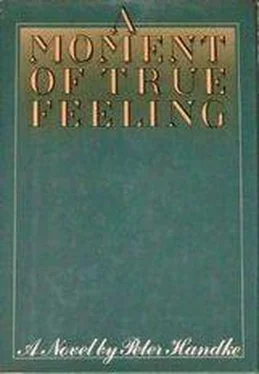He behaved as innocently as possible: for the first time he bought flowers for his girl friend. An observer’s suspicions would be overcome if he saw him going into this florist’s shop. He was only one among many, someone concerned with everyday matters, carefree enough to buy flowers. He decided to be pedantic. In the cool shop, seeing himself as a man having gladioli wrapped, he felt so secure that he would have liked to help the salesgirl tie the bow. The atmosphere, the smell of water, the puddles on the floor, did him good. The beautiful, slow meticulousness with which she set down the gladioli side by side on the paper! Up until now, when asked whether flowers should be gift wrapped, he would automatically have said no and contented himself with the usual wrapping; today he looked on with interest as the girl stuck the pins into the paper. During the whole operation — cutting the stems, removing the faded petals, wrapping, and finally handing him the wrapped flowers — she had not made one superfluous movement, and today this struck him as beautiful. In the shop he felt sheltered. He was able to smile, though his lips tautened, and she smiled too. Her purely professional friendliness made him feel that she was treating him as a human being, and that touched him.
Just like anyone else he climbed the slope of Montmartre with his bouquet. Amid the smells of the rue Lepic, changing from one market stall to the next — fish, cheese, the flannel smell of suits hanging in the sun — he lost all identity … Then suddenly the smell of bread from the open door of a bakery drew him into memory, not his own, but a new, amplified, and improved memory, in which the flat scene before him took on a third dimension. Here no one seemed irresolute, weighed down by himself; among these people, whom he would never know, he felt secure. Outside his girl friend’s door, he wiped his shoes with exaggerated care, meanwhile laughing maliciously — at whom? — But when he heard steps approaching from within, he was seized with desperate embarrassment at the thought that their meeting would be the same as usual, shameless, that they would smile at each other in recognition. There was still time, he could still climb another flight of stairs. Keuschnig stood motionless, one foot beside the other, until the door opened — as usual, except that now the absurdity almost killed him.
He didn’t show that anything was wrong. For a moment it had upset him that Beatrice recognized him right away. Suddenly he was afraid that he wouldn’t recognize her the next time, and tried to imprint her features, or some distinguishing mark, on his memory. — Beatrice worked part-time as a translator at UNESCO headquarters in the 15th arrondissement. Her husband had been killed when his motorcycle had collided with a trailer truck. She lived alone with two children, who were out at the moment. Keuschnig had first met her at a reception at the embassy. She had come up to him and asked: “What shall we do now?”—He came to see her often. He liked to watch her going about her domestic routines. She told a good many stories, and it gave him a strong tranquil pleasure to listen to her. “I’m never afraid of doing anything wrong in front of you,” she said. They saw no harm in being together. “Maybe our seeing no harm in it is a good sign,” said Beatrice. She took everything that came her way as a sign. But even where others saw a harbinger of calamity, she found confirmation of her belief that things would get better and better. Unpleasant happenings irritated her, but she took them too as favorable signs. Consequently she lived confidently from day to day, and when Keuschnig was with her, the moment when everything would cease to count seemed to him, sometimes at least, infinitely remote.
But now, without warning, everything in sight became a sign of death. He didn’t want to look at anything; and because, even with his eyes open, he saw nothing to which he could hold fast, the oppression in his chest rose to his throat. He thought of the baby carriage with the plastic cover in the doorway and the crumbled plaster on the cover, and turned away without meaning to when as usual Beatrice started to help him out of his jacket. But it was he who was suddenly afraid of saying something wrong, or doing something wrong; it was he who suddenly couldn’t help seeing some harm in everything, in cutting meat, in an embrace, even in breathing. The acts that should be performed naturally — drawing-the-cork-out-of-the-bottle, spreading-the-napkin-on-his-knees — he now performed as ceremonial functions and was afraid of being untrue to his role. In mortal terror, he suddenly called up his home. “Is all well?” he asked, deliberately using the stilted phrase to hide his anxiety. Back at the table, he was determined to do everything by himself, though as a rule he had liked Beatrice to peel an apple for him, for instance, at the end of the meal.
He didn’t let her undress him. If she were to touch him, he would crush her with his fist. The actions of laying-his-trousers-over-the-back-of-a-chair, of lying-down-in-bed-together, of inserting-the-penis-in-the-vagina. When she stroked his member with her fingernail, he felt she was infecting him with some loathsome skin disease. Intermittently, under the light pressure of her vagina, he felt protected, but at the orgasm, in place of something hot, a cold shiver came out of him and instantly spread over his whole body. He wished he were washed and dressed that minute, sitting opposite her, at some distance. When she looked at him, he passed his thumb over her lids as though in a caress, to make her close her eyes and stop seeing him. A moment later she opened them again. Those open eyes seemed to be laughing; this time he forcibly held them shut. Beatrice turned her head away from his hand and went on looking at him, more amused than alarmed. Thereupon he closed his own eyes. — He kept them closed until he felt safe again. Then it became unbearable not to see anything. When he opened his eyes, his lids popped obscenely, as though they had been pasted and an effort had been needed to tear them open, first one, then the other. Beatrice was still looking at him, or rather, she had begun to watch him — as though something were wrong. Though her mouth was closed, her lips were slightly parted at one corner, revealing a bit of glinting canine. He thought of a dead pig, but only to avoid feeling inferior to her. The longer they looked at each other, the more concerned she became and the more he lost interest. Merely because he hadn’t a thought in his head, he grimaced — no, his face turned into a grimace without his stirring a muscle. He simulated a yawn, so as to be able to close his eyes again. Then he took hold of Beatrice’s hair and forced her head down to his belly; she took his member into her mouth and pushed it out with her tongue; if her face had been on a level with his, he might have thought she was sticking out her tongue at him. Filled with warmth, he had a feeling that he and Beatrice briefly belonged together, and that if he could only start talking, he would come to understand her completely.
In the kitchen they drank coffee. He watched her taking the crême caramel out of the icebox, so it wouldn’t be too cold when the children came home. Then she did indeed sit down across from him, out of reach, just as he had wished, and carefully sharpened pencils, lead pencils for the older child and colored pencils for the younger one, who still went to the école maternelle. As he looked at her, he succeeded little by little in immersing himself in his vision. He heard the water flowing in the gutter of the silent street outside the open window. It gurgled over an occasional jutting stone, and the longer he listened the more his vision expanded; the flowing water turned into a brook, whose gurgling flow related to an almost forgotten event. The pencils, which Beatrice kept turning in her pencil sharpener, RASPED — and suddenly Keuschnig couldn’t remember his own name. He was out of danger as long as so much unfinished business was left on the kitchen table. Kitchen table: those words meant something now. A certainty. He could get up and leave it, yet always come back to this place — where there were red floor tiles and Beatrice, attentively turning pencils but then suddenly holding a pencil still and turning the sharpener, as though a mere fancy in her head had become an embodied wish, as though an impersonal idea had become a personal contradiction or a long-outgrown memory a present emotion. The apartment around him now seemed to be on ground level, yet bright and airy as if it were somewhere high in the sky. — Ecstatically Keuschnig closed his eyes to keep from crying, but also to relish his tears the more.
Читать дальше












